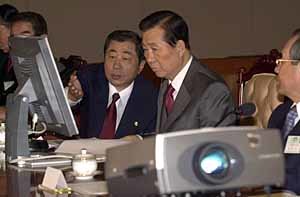Large consortium may be given priority

The government has decided to select three operators for the next-generation IMT-2000 (International Mobile Telecommunication) business. The operators will be chosen from among consortiums which promised to make contribution of more than 1 trillion won. An open screening will be conducted to select the three operators with priority given to the financial status, technology and the manager's ability, among others. In particular, consortiums which include members who can generate strong synergy effects will be given priority, thus inducing the bidders to form large-scale consortiums. The contribution can be made in installments over the coming 10 years at the longest.
The Ministry of Information and Communication set the highest contribution at 1.3 trillion won, while the lowest at 1 trillion won. If the number of bidders is equal to that of the operators (three) or less, they have to make a contribution of 1.15 trillion won or more, according to the ministry.
The contribution per operator will basically go to the enhancement of informatization in Korea. The money will be utilized only for the investment in the future of the nation's information and communication as stipulated by law. The plan to use the contribution and the result should be reported to the National Assembly every year for review.
The amount of contribution was derived from taking 3 percent from each of the 15 years the operators would be in business. As a result, the standard contribution amount per operator comes out to be 1.3 trillion won, with 1 billion won at the minimum. For personal communications service companies, the standard amount was equivalent to the 7 percent of the turnover for five years.
The ministry offered a number of options in paying the contribution, although half of that will have to be deposited in full before they are given formal licenses and the remaining half will be paid any time within 10 years, including interests, according to the ministry.
On the technical side, the government did not specify which of the two major technologies - the one used in Europe, or the one used in the United States ?the applicants should choose from.
The ministry will also form a subcommittee in the Information-Communication Policy Deliberation Committee to listen to the opinions of related industries and civic organizations in order to work out better criteria for screening the bidders.
The adopted revised criteria will be made public to the press. The ministry plans to confirm the modified plans after collecting public opinions through hearings via Internet and others toward the end of this month.
A screening committee member will be chosen at the recommendation by information-communication research bodies, academic circles and civic groups. The committee members will be given a free hand to select the winners, the ministry said. Against the practice of the past, all the procedures of the screening will be made public.
Headline News
- Half of working seniors earn less than 1 million won per month
- S. Korea prepares to monitor N. Korean military activities amid POW concerns
- Shinsegae Group officially splits department stores and E-Mart affiliates
- Starbucks issues ‘come to the office 3 times a week or be fired’ notice
- Ha Hyeong-joo chosen as 2024 Sports Hero of Korea







